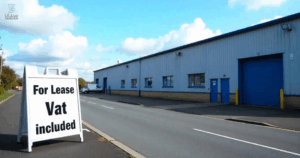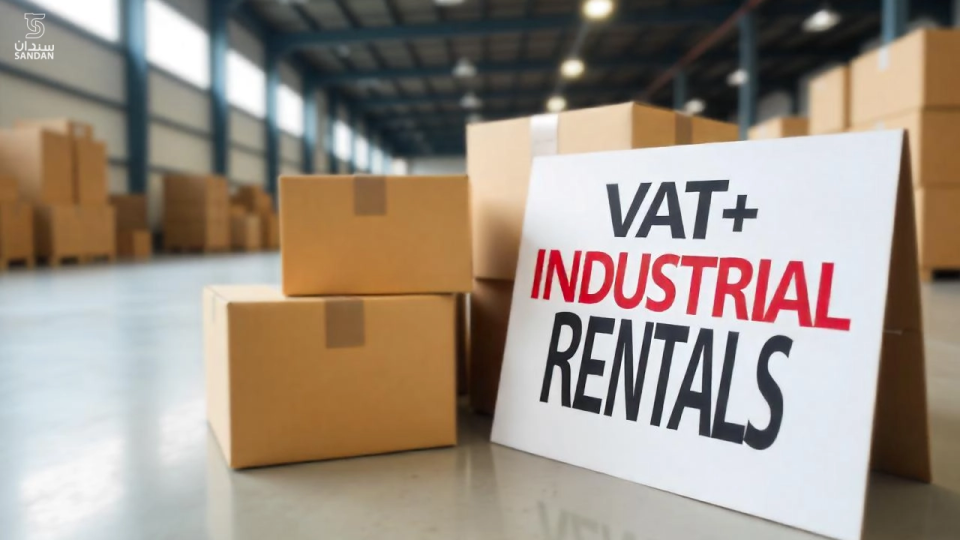As Oman’s economy diversifies and industrial activity expands under Vision 2040, businesses operating in the country must factor in more than just infrastructure and labor—they must now account for tax obligations too. One of the most significant financial considerations in 2026 is the VAT on industrial rent in Oman. For businesses leasing warehouses, manufacturing spaces, or service workshops, understanding how VAT applies to their industrial property costs is critical to budgeting accurately and avoiding compliance issues.
While VAT in Oman was first introduced in 2021, its implications are now becoming more prominent as the leasing and real estate sectors mature under the new tax regime. Whether you’re a local SME, a multinational company, or a new investor eyeing Oman’s industrial park, VAT-related expenses can have a measurable impact on your operational costs and cash flow planning.
In this blog, we’ll break down how VAT industrial rent Oman policies work, what to expect in 2026, and how to budget smartly. You’ll also learn why choosing the right location—like Sandan—can make a substantial difference in navigating VAT responsibilities more efficiently.
Overview of VAT in Oman
VAT Implementation Timeline and Framework
The Value Added Tax (VAT) system was officially introduced in Oman on April 16, 2021, under Royal Decree No. 121/2020. This marked a major shift in the country’s revenue structure, aligning it with other GCC countries adopting indirect taxation to reduce reliance on oil income. The Oman Tax Authority (OTA) is responsible for implementing and regulating the VAT framework.
Standard VAT Rate and Categories
Oman currently applies a standard VAT rate of 5% on most goods and services. However, certain categories, such as healthcare, education, and basic food commodities, may be zero-rated or exempt. Industrial real estate, including leasing of warehouses, workshops, and manufacturing units, generally falls under the standard-rated category, making VAT on industrial rent in Oman a recurring operational cost for most businesses.
Who Must Register for VAT and When?
Businesses with annual taxable supplies exceeding OMR 38,500 are required to register for VAT. Voluntary registration is available for those with revenue over OMR 19,250. Registration is mandatory for both local and foreign entities conducting taxable activities in Oman, including industrial leasing arrangements.
General Impact on Real Estate and Leasing Markets
The introduction of VAT has added an extra layer of complexity to the real estate and leasing markets. Landlords are now required to issue VAT-compliant tax invoices, while tenants must account for the additional 5% in their rental budgets. This is particularly relevant for VAT industrial rent in Oman, where long-term leasing commitments are common, and cost predictability is vital. The shift has also encouraged tenants to seek out transparent, tax-compliant industrial parks like Sandan, where lease terms and VAT obligations are clearly defined.
What Is Considered As Industrial Rent?
In Oman, industrial properties typically refer to real estate assets used for manufacturing, logistics, warehousing, assembly, or workshop-related activities. These include factories, cold storage units, dry storage warehouses, automotive workshops, and other facilities designed for production or industrial processing.
What Qualifies as Rent Under Oman Tax Law?
Under Omani VAT law, rent is considered a taxable supply when it involves the right to occupy or use a property for a specified duration in exchange for monetary consideration. In the case of industrial properties, this includes base rent, maintenance charges, service fees, and in some cases, utility costs—depending on how they’re structured in the lease agreement.
Difference Between Commercial, Residential, and Industrial Leases
Residential leases are exempt from VAT in Oman, while commercial and industrial leases are typically subject to the standard VAT rate of 5%. Commercial leases generally apply to office spaces and retail units, whereas industrial leases are tied to facilities like warehouses and production units.
This distinction is important for businesses budgeting for VAT industrial rent in Oman, as they must ensure that leases for industrial use are VAT-compliant and that 5% VAT is factored into operational costs. Landlords leasing industrial spaces are also obligated to register for VAT and issue compliant tax invoices.
# VAT Industrial Rent Oman Use Case
For instance, if a logistics company leases a 2,000 sqm warehouse in Sandan Industrial City, the monthly rental of OMR 2,000 would be subject to an additional 5% VAT—an extra OMR 100/month, or OMR 1,200 annually. Over a 5-year lease, this adds up to OMR 6,000 in VAT, making it essential for businesses to plan ahead for VAT industrial rent in Oman liabilities.
VAT Applicability on Industrial Rentals
When VAT Is Applicable on Lease Agreements
VAT applies to all industrial lease agreements where the property is used for taxable business activities. Whether you’re signing a new lease, renewing an existing one, or modifying lease terms (such as fit-outs or adding space), VAT is triggered if the property is leased for industrial purposes. These terms are especially important in the context of VAT industrial rent in Oman, where long-term leases are common in zones like Sandan.
Zero-Rated vs. Standard-Rated Transactions
Most industrial rental transactions are standard-rated at 5%. However, certain transactions, such as exports, designated free zones, or special economic zones, may fall under zero-rated provisions, provided the criteria are met. Still, the majority of VAT industrial rent cases fall under the standard-rated umbrella.

Scenarios That Trigger VAT on Industrial Rent
- New Lease Agreements: All new industrial leases are subject to 5% VAT unless explicitly exempted.
- Lease Renewals: If terms change or the value increases, the VAT is recalculated.
- Fit-Out Contributions: If landlords provide custom fit-outs or equipment installations and charge tenants, VAT may apply to those services too.
Responsibilities of Landlords and Tenants
The landlord is responsible for charging and collecting VAT, issuing tax invoices, and filing returns with the Oman Tax Authority. Tenants, on the other hand, must ensure that VAT invoices are received and accounted for. If the tenant is VAT-registered, they can claim input VAT on their returns, subject to eligibility.
How VAT Affects Industrial Rent Planning?
The introduction of VAT has made budgeting for industrial space more complex. Businesses must now plan not only for base rent and operational costs but also for VAT industrial rent obligations in Oman. This has led many companies to favor well-regulated, transparent industrial zones like Sandan, where leasing terms, VAT obligations, and support services are clearly structured.
Budgeting for VAT in 2026: Key Considerations
Factoring VAT into OPEX and CAPEX
For businesses operating within Oman’s industrial real estate sector, it is essential to treat VAT on industrial rent as a non-negotiable part of both operational (OPEX) and capital expenditures (CAPEX). Whether you’re leasing a warehouse, workshop, or logistics unit, the 5% VAT rate must be integrated into your monthly and annual budgeting cycle.
Forecasting Cash Flow and Future Cost Escalation
As lease values often increase upon renewal or indexation, VAT liabilities also rise proportionately. For instance, a lease escalation of 10% automatically increases the associated VAT. Companies should forecast these variations into their long-term cash flow planning to avoid budget overruns. This is particularly important when managing VAT industrial rent Oman, where industrial lease terms commonly span 3–10 years.
Including VAT in Lease Negotiations
Businesses negotiating new industrial leases or renewals in 2026 should proactively discuss VAT terms. Questions like “Is VAT included or exclusive of the quoted rent?” or “Will the landlord handle VAT filing?” can help clarify obligations early. Businesses in Sandan and similar zones often benefit from transparent lease agreements that clearly define VAT clauses.
Role of Accountants and VAT Advisors
A professional accountant or tax advisor can assist businesses in ensuring VAT compliance, optimizing reclaimable VAT, and avoiding penalties. For any business planning long-term operations in Oman, especially in zones where VAT industrial rent Oman applies, consulting a VAT advisor is a critical step for strategic financial planning.
How VAT Affects SMEs and Foreign Investors?
VAT Planning for Small and Medium Enterprises
SMEs are particularly sensitive to VAT-related cash flow issues. Even though VAT industrial rent Oman is claimable if the entity is VAT-registered, the timing of input tax recovery can affect liquidity. SMEs leasing industrial space should calculate monthly VAT impact and assess how it aligns with their sales tax recoverability timeline.
Recoverability of VAT for Registered Businesses
If your SME is registered under Oman’s VAT regime and primarily engages in taxable supplies, you are eligible to reclaim the input VAT on your lease. However, delays in registration or errors in documentation can result in missed claims. This makes it essential for businesses paying VAT on industrial rent to maintain accurate VAT invoices and records.
Foreign Investors and Non-Resident Tenants
Foreign-owned companies or joint ventures that lease workshops, warehouses, or service facilities are equally subject to VAT industrial rent Oman. While these entities can benefit from reclaiming VAT, they must first obtain VAT registration and understand Oman’s reverse charge mechanism if applicable. Sandan’s support services often assist foreign tenants with VAT compliance and documentation.
# Why Non-Local Tenants Pay Attention?
For foreign businesses operating without a local partner or mainland entity, navigating Oman’s VAT landscape can be challenging. Nevertheless, understanding the VAT treatment on leases—especially in industrial zones—can significantly affect the total cost of renting or expanding into Oman. Keeping VAT compliance in check ensures smoother customs coordination, utility setup, and financial forecasting.
Sandan as a VAT-Conscious Industrial Park
Transparent Leasing and VAT Documentation
One of the biggest challenges with VAT industrial rent Oman is the lack of clarity in lease agreements. Sandan Industrial Park has addressed this by offering transparent leasing contracts that clearly outline whether VAT is included or exclusive of the stated rent. Each agreement is backed with proper VAT-compliant documentation, ensuring tenants avoid legal ambiguity and financial miscalculations.
Support with VAT Registration and Compliance
For startups, SMEs, and foreign investors, the VAT registration process in Oman can seem daunting. Sandan bridges this gap by offering guidance and on-site support for businesses needing help with VAT registration. This includes connecting tenants with certified consultants, ensuring all paperwork is handled efficiently, and clarifying how VAT industrial rent Oman applies to their tenancy.
Affordable Rents Despite VAT Impact
Even with VAT included, Sandan’s rental rates remain competitively priced compared to Muscat’s urban centers and other free zones. The park offers scalable spaces—ideal for warehouses, showrooms, and workshops—ensuring that budget-conscious tenants can still operate without overshooting operational budgets due to VAT industrial rent Oman.
# Why Sandan Appeals to Industrial Tenants?
Thanks to its strategic location, supportive ecosystem, and VAT-conscious leasing practices, Sandan is increasingly becoming the top choice for businesses seeking compliance without cost strain. Its clarity around VAT industrial rent Oman, combined with industrial-grade infrastructure, makes it ideal for long-term, growth-focused enterprises.
Common Mistakes Businesses Make With VAT on Rentals
Mistake 1. Delayed or Missed VAT Registration
One of the most frequent errors seen among SMEs and new market entrants is failing to register for VAT on time. Since VAT industrial rent Oman applies to most eligible industrial leases, this oversight can result in penalties and missed opportunities for input VAT recovery.
Mistake 2. Misunderstanding VAT-Inclusive Amounts
Businesses often assume that quoted lease values are VAT-inclusive, only to discover hidden costs upon invoicing. Misinterpreting tax invoice formats can also lead to under-budgeting. Clarifying whether your lease is VAT-inclusive or exclusive is critical when budgeting for VAT industrial rent Oman.
Mistake 3. Overlooking Lease Renewals and Escalations
Many businesses forget that rental escalations or lease renewals often trigger new VAT implications. A rent hike also means higher VAT payments, and missing this during budget planning can strain finances. Being proactive about future VAT impacts helps avoid budget shocks related to VAT industrial rent Oman.
Mistake 4. Poor VAT Record-Keeping
Improper documentation, missing tax invoices, or inconsistent VAT filings can disqualify businesses from claiming input VAT. This becomes particularly costly in the case of industrial leasing, where rent values are significant. Ensuring consistent record-keeping and using digital tools can protect your claimable VAT tied to VAT industrial rent Oman.
Tips to Manage VAT More Effectively
Tip 1. Consult VAT Experts Early
Businesses planning to lease industrial space in Oman should involve certified VAT consultants at the earliest stages. Whether you’re a local entrepreneur or a foreign investor, a tax advisor can help interpret how VAT industrial rent Oman applies to your lease, especially when dealing with complex terms or multi-year agreements.
Tip 2. Clarify Lease Terms: VAT Inclusive or Exclusive
Before signing any lease, ensure the agreement explicitly states whether the quoted rent is VAT-inclusive or exclusive. This clarification prevents budget surprises and allows you to calculate your exact financial obligation under VAT industrial rent Oman regulations.
Tip 3. Leverage Accounting Software
To stay compliant and avoid misreporting, use accounting tools that help track VAT charges, liabilities, and credits. Platforms like Zoho Books, Tally, or QuickBooks are commonly used in Oman and are capable of handling complexities around VAT industrial rent Oman, including input tax recovery and invoice documentation.
Tip 4. Maintain Thorough Records
Proper documentation is vital for audits, tax refunds, and renewals. Keep all VAT invoices, rental agreements, and transaction records organized and accessible. This not only ensures compliance but also facilitates smooth refund claims or adjustments related to VAT industrial rent Oman over time.
Frequently Asked Questions
Is VAT applicable on all industrial rentals in Oman?
Yes, under current laws, VAT industrial rent Oman applies to most leasing agreements for industrial properties such as workshops, warehouses, and factories, unless otherwise zero-rated under specific exceptions.
How can I check if my industrial rent is VAT-inclusive?
Always ask the landlord or leasing agent for a VAT-compliant invoice and review your lease contract. It should clearly state whether the rent is exclusive or inclusive of VAT under VAT industrial rent Oman guidelines.
Can VAT paid on industrial rent be claimed back?
If your business is VAT-registered and the rent is used for taxable activities, you can generally recover the VAT paid on rent. This is an important benefit under VAT industrial rent Oman policies.
What happens if I don’t pay VAT on time?
Delayed VAT payments can result in penalties and interest. For tenants under VAT industrial rent Oman, timely compliance is crucial to avoid financial liabilities.
Does VAT apply to both lease renewals and new contracts?
Yes. Renewals, modifications, or new leasing contracts are subject to VAT under VAT industrial rent Oman. Be sure to reassess VAT implications whenever renegotiating terms.

Conclusion
As Oman’s business environment becomes more regulated and transparent, understanding how VAT industrial rent Oman affects your financial planning is no longer optional—it’s essential. Whether you’re an SME setting up a light industrial unit or a multinational expanding warehouse operations, VAT must be factored into every aspect of your rental decisions.
From defining VAT applicability on lease agreements to forecasting cash flows and ensuring compliance, businesses that plan early will avoid unexpected costs and benefit from better financial control. Especially for SMEs and foreign investors, navigating VAT can feel overwhelming. But with the right advisors, clear documentation, and a supportive leasing partner, the process becomes much more manageable.
Industrial parks like Sandan not only offer VAT-compliant leases but also help businesses with end-to-end setup support, documentation, and transparency—making them ideal for cost-sensitive, growth-focused industrial tenants.
Ready to lease smarter and budget better in 2026? Explore VAT-conscious, infrastructure-ready spaces at Sandan today. Reach out to our leasing team and discover how your business can stay compliant while optimizing every Rial spent.












